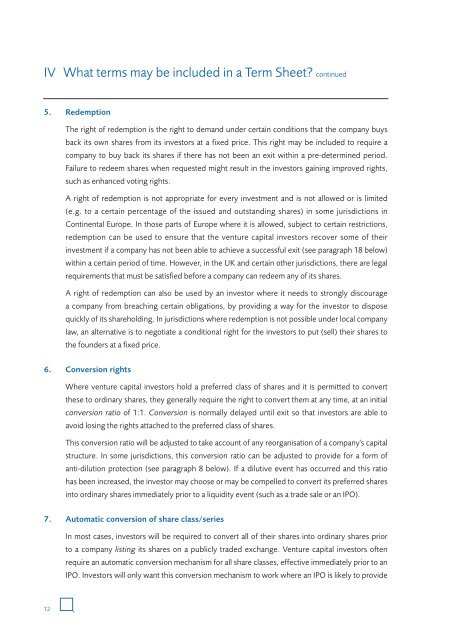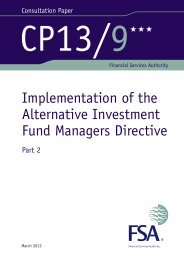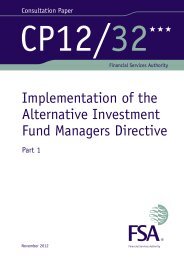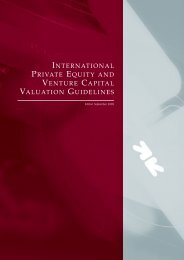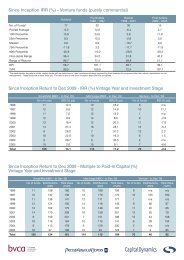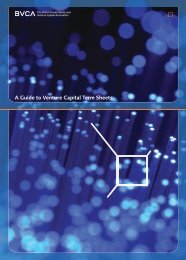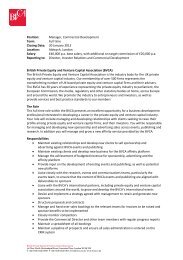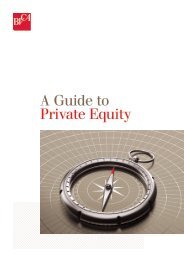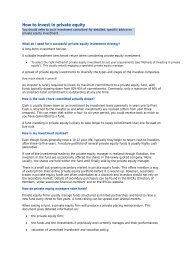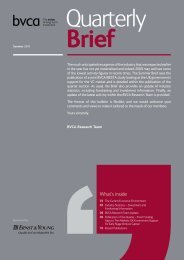Guide to term sheets - BVCA admin
Guide to term sheets - BVCA admin
Guide to term sheets - BVCA admin
You also want an ePaper? Increase the reach of your titles
YUMPU automatically turns print PDFs into web optimized ePapers that Google loves.
IV What <strong>term</strong>s may be included in a Term Sheet? continued<br />
5. Redemption<br />
12<br />
The right of redemption is the right <strong>to</strong> demand under certain conditions that the company buys<br />
back its own shares from its inves<strong>to</strong>rs at a fixed price. This right may be included <strong>to</strong> require a<br />
company <strong>to</strong> buy back its shares if there has not been an exit within a pre-de<strong>term</strong>ined period.<br />
Failure <strong>to</strong> redeem shares when requested might result in the inves<strong>to</strong>rs gaining improved rights,<br />
such as enhanced voting rights.<br />
A right of redemption is not appropriate for every investment and is not allowed or is limited<br />
(e.g. <strong>to</strong> a certain percentage of the issued and outstanding shares) in some jurisdictions in<br />
Continental Europe. In those parts of Europe where it is allowed, subject <strong>to</strong> certain restrictions,<br />
redemption can be used <strong>to</strong> ensure that the venture capital inves<strong>to</strong>rs recover some of their<br />
investment if a company has not been able <strong>to</strong> achieve a successful exit (see paragraph 18 below)<br />
within a certain period of time. However, in the UK and certain other jurisdictions, there are legal<br />
requirements that must be satisfied before a company can redeem any of its shares.<br />
A right of redemption can also be used by an inves<strong>to</strong>r where it needs <strong>to</strong> strongly discourage<br />
a company from breaching certain obligations, by providing a way for the inves<strong>to</strong>r <strong>to</strong> dispose<br />
quickly of its shareholding. In jurisdictions where redemption is not possible under local company<br />
law, an alternative is <strong>to</strong> negotiate a conditional right for the inves<strong>to</strong>rs <strong>to</strong> put (sell) their shares <strong>to</strong><br />
the founders at a fixed price.<br />
6. Conversion rights<br />
Where venture capital inves<strong>to</strong>rs hold a preferred class of shares and it is permitted <strong>to</strong> convert<br />
these <strong>to</strong> ordinary shares, they generally require the right <strong>to</strong> convert them at any time, at an initial<br />
conversion ratio of 1:1. Conversion is normally delayed until exit so that inves<strong>to</strong>rs are able <strong>to</strong><br />
avoid losing the rights attached <strong>to</strong> the preferred class of shares.<br />
This conversion ratio will be adjusted <strong>to</strong> take account of any reorganisation of a company's capital<br />
structure. In some jurisdictions, this conversion ratio can be adjusted <strong>to</strong> provide for a form of<br />
anti-dilution protection (see paragraph 8 below). If a dilutive event has occurred and this ratio<br />
has been increased, the inves<strong>to</strong>r may choose or may be compelled <strong>to</strong> convert its preferred shares<br />
in<strong>to</strong> ordinary shares immediately prior <strong>to</strong> a liquidity event (such as a trade sale or an IPO).<br />
7. Au<strong>to</strong>matic conversion of share class/series<br />
In most cases, inves<strong>to</strong>rs will be required <strong>to</strong> convert all of their shares in<strong>to</strong> ordinary shares prior<br />
<strong>to</strong> a company listing its shares on a publicly traded exchange. Venture capital inves<strong>to</strong>rs often<br />
require an au<strong>to</strong>matic conversion mechanism for all share classes, effective immediately prior <strong>to</strong> an<br />
IPO. Inves<strong>to</strong>rs will only want this conversion mechanism <strong>to</strong> work where an IPO is likely <strong>to</strong> provide


